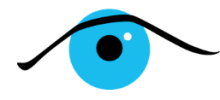Originally appeared in
EARTH STAR MAGAZINE December 2004/January 2005
By Rosemary Gaddum Gordon, D.B.O., M.A.
Corrective lenses are a wonderful discovery. Looking through them we instantly see more detail. They fit on the face or cornea and we no longer have to worry about our blurry vision. There’s just one hitch, most people need stronger lenses within a few years. These lenses are not “corrective” as in therapeutic, they are only “corrective” in that they seem to make the problem go away.
Aldous Huxley used the analogy that glasses are like crutches. If we break a leg we use crutches while the bone heals, but we don’t expect to be on them for the rest of our lives. When we remove the cast, the muscles of the hurt leg have weakened, so we do exercises. As we practice we wean ourselves off the crutches and, depending on the injury, can expect to regain most of our previous agility and strength.
Another problem with lenses is that they do not adapt to the natural changes in our eyesight. They have a set shape and power. Normal vision varies. It often becomes less sharp when we are tired, sick or anxious and clearer when we’re content, at peace and in a beautiful place. The prescription we are given may be perfect for how we saw in the doctor’s office, but once outside, circumstances change. If we relax, for instance, our vision will improve and then the prescription is too strong.
It is best to address the underlying problem of the visual disturbance at the time when it occurs. If this is not possible and your vision continues to be blurry or your eyes fatigued, have an eye exam and get some glasses. Wear the glasses for emergencies only and find help with whatever you think is stressing your eyes. It may be physical over-use, emotional stress, mental boredom or any combination of things causing a breakdown of some of your visual skills. The change in your vision is your unique response to your world. It is your body/mind’s way of letting you know that something is out of balance.
If you work with a Vision Educator, besides rebuilding your visual skills, you will get some therapeutic glasses that slightly under-correct you. In this way when you relax you will see clearly and when you don’t see so clearly, you will be reminded to practice the skills you are learning. When you see well through those glasses you get an even weaker pair; gradually, you wean yourself from the lenses.
As you inquire into what the imbalance might be, rest as much as you can. Rest your eyes using some of the techniques described in previous issues like Palming, Blinking and Changing Focus frequently. Rest your whole body by getting more sleep. And rest your mind by doing things that nurture you: spending time in Nature, going to a concert or the movies or just hanging out with friends.
Healing naturally takes time. Whether it’s from a cold, a broken bone or surgery, adequate rest and relaxation allow the process to unfold more effectively, giving us time to listen to our own wisdom as we rediscover our equilibrium.


Sorry, comments are closed for this post.